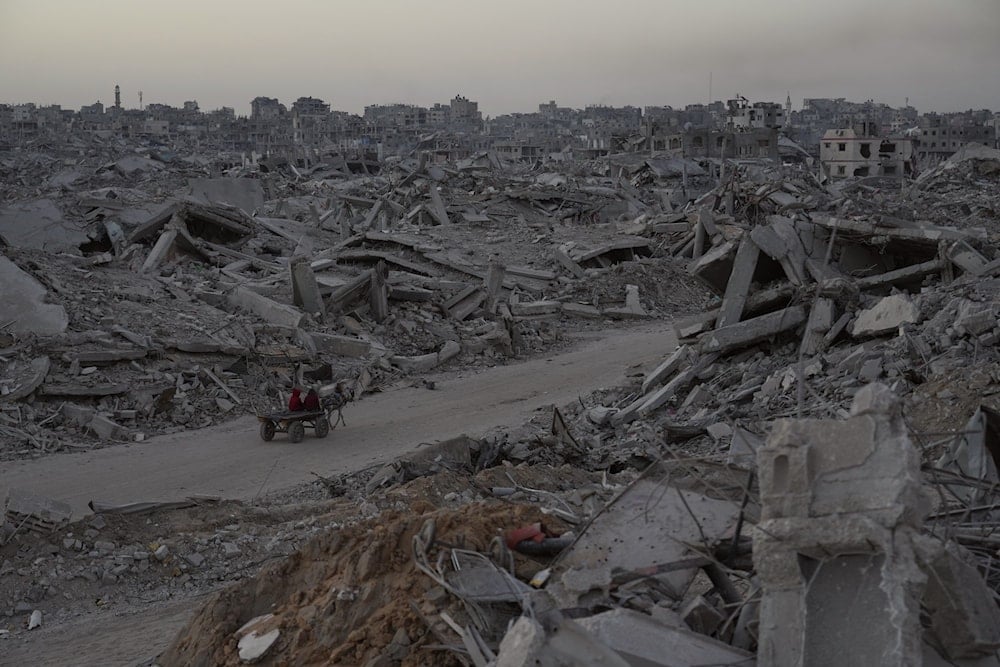WHO chief warns Gaza's health crisis will last for 'generations'
Dr. Tedros Adhanom warns of a generational health catastrophe in Gaza, citing famine, disease, and "Israel’s" aid restrictions as key obstacles to recovery.
-

Palestinians travel by horse cart amid the destruction caused by the Israeli war on Gaza in the Sheikh Radwan neighborhood in Gaza City, Wednesday, Oct. 22, 2025 (AP)
The director-general of the World Health Organization (WHO), Dr. Tedros Adhanom Ghebreyesus, has declared that Gaza is experiencing a health catastrophe that will last for "generations to come."
Dr. Tedros Adhanom Ghebreyesus explained on BBC Radio 4's Today programme that a massive increase in aid is the necessary first step to begin addressing the complex needs of the people in the Strip. The WHO chief emphasized that the current level of aid allowed into the strip by "Israel" is far below the levels needed to rebuild the healthcare system in the territory.
When asked about the situation on the ground, he detailed how Gaza residents have experienced famine, "overwhelming" injuries, and a collapsed healthcare system, compounded by outbreaks of disease fueled by the destruction of water and sanitation infrastructure.
'Israel' is exacerbating the healthcare crisis in Gaza
All of this is further exacerbated by restricted access to humanitarian aid, creating what the WHO director-general described as a "very fatal combination" that makes the situation both catastrophic and beyond words.
"If you take the famine and combine it with a mental health problem, which we see is rampant, then the situation is a crisis for generations to come," Dr. Tedros stated when asked about the prognosis in Gaza.
On October 19, "Israel" temporarily halted aid deliveries after it said two Israeli troops were killed in an attack by an ambush allegedly conducted by Hamas, which refuted these claims at the time and said it was not aware of the incident.
Dr. Tedros stated that aid must not be "weaponized", and he directly called on "Israel" to refrain from imposing conditions on its delivery, including demands concerning the return of the remains of dead hostages still in Gaza, which has become a key point of contention during the ceasefire.
"There should be full access, there should not be any condition, especially after all the living hostages were released, and a good part of the remains are transferred. I did not expect there would be additional restrictions," he emphasized.
He stated that "all available crossings" were needed to get enough aid into Gaza and called on "Israel" to allow the return of aid groups previously denied registration, asserting, "You can't have a scaled up response without those who can deliver on the ground."
More border crossings must be opened
Currently, only two crossings are open to Gaza, the Karem Abu Salem crossing and the Kissufim crossing, both of which are operated by "Israel". The Rafah crossing, among others, remains shut.
The WHO chief noted that "Israel" has been seizing essential supplies that were supposed to enter the strip under the false pretense that these materials could be used to build military bases. "If you are going to build a field hospital, you need the canvas and the pillars [for tents. So if the pillars are removed, because of an excuse that they could be dual-use, then you can't have a tent."
"We have been saying for a long time that peace is the best medicine," Dr. Tedros told the BBC, highlighting the fact that some of the same Palestinians who celebrated the ceasefire were recently killed after the ceasefire was broken several times.

 3 Min Read
3 Min Read











